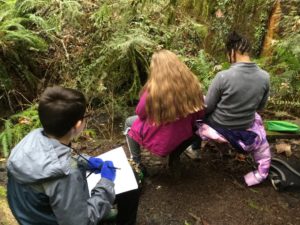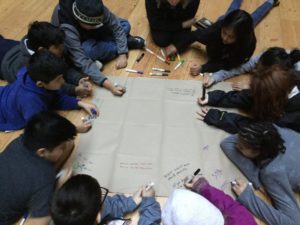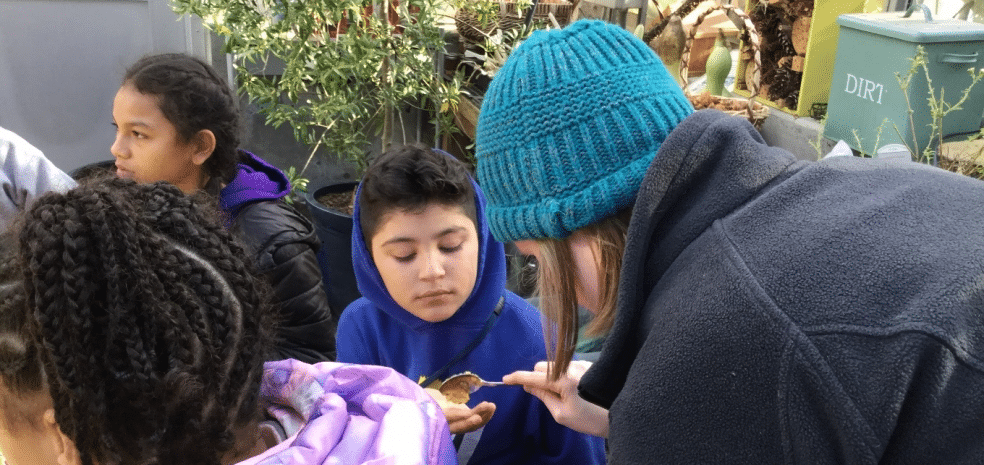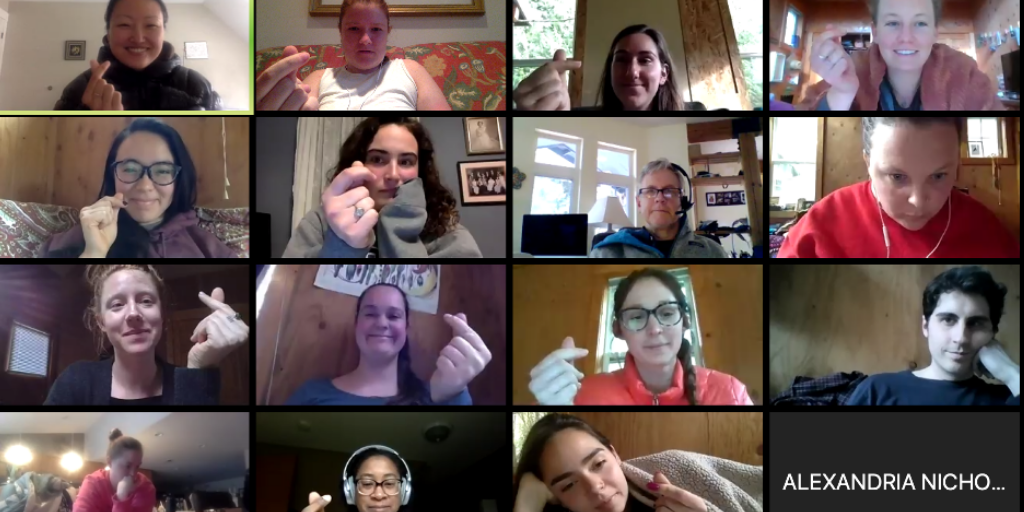Bryant Elementary was one of the schools included in our pilot program of the School…
Author: Julia Glassy
A few weeks ago, a student came up to me and said, “Julia, I feel funny.” “What do you mean by that?” I asked. “Can you share some examples of that feeling?” My student thought for a few moments and turned back to me, and with clarity and sureness he said, “I think I am homesick.”

School Overnight Program students recording observations in the forest.
This was the first time one of my School Overnight Program (SOP) students has ever told me that they were homesick. This was a reality check for me and made me think about all my other students at IslandWood. Have they not felt comfortable enough with me as a new teacher in their lives to share with me that they are homesick, or have my students not been fully aware that they were even experiencing homesickness, or is it something else entirely?
Students come over to Bainbridge Island to IslandWood for four days. Some have a family member or guardian here with them, but most do not. (We usually do not encourage the family member or guardian to chaperone their child’s field group, but students are able to see this person in the lodge or dining hall and during evening programs.) Students may also have their teacher or another member of the school community as their chaperone, in addition to an IslandWood instructor. This experience with this particular student made me realize the impact of not having a family member or guardian with them during this immersive, unfamiliar, outdoor learning experience.
Without a doubt, I try my hardest as a graduate student educator at IslandWood to help my students feel safe, heard, and valued in our group. I do this by remembering each student’s name by the end of the first day. This helps me build rapport with each student allowing them to hopefully feel like they have a connection with me. I also shape my week based on what the group needs, meaning the first day we may begin gradually, spending a lot of time on team building activities, games, and free-exploration of the forest ecosystem. Other times, we jump right in to more structured exploring and investigating IslandWood’s campus after only a few short
games and team building activities.
During my teaching weeks, I try to make sure each one of my student’s needs are being met before, during, and after activities, games, and lessons to make sure they can connect with the material, but also with their peers. My goal for my students is that they try their best while they are away from their community. If a student is homesick, they are going to focus on the emotions that are taking over their thoughts and overall being. No matter how exciting the lesson may be, if students are homesick or going through other strong emotions, those are going to outweigh anything else. This is why it is so important as an educator to build trust and rapport with students before moving on to anything else. Some students do not want to share their emotions with the whole group because many of them believe it shows a weaker side of themselves. I do not believe this for a second, but students do, and I need to make sure that if my student wants to share something with me one-on-one rather than in a larger group setting, that I am flexible in my teaching.
Before my student confided in me, I did not see what I assumed were the signs of homesickness, but now I know it looks different for each child. This particular student was having a hard time staying focused, but I did not understand why. He told me he was homesick as we were returning to the lodge for the night, and during our walk we were able to talk through it. The next morning he did seem like he got a little more sleep and was ready for the day. He seemed slightly more engaged in group settings, but when we interacted one-on-one he seemed like a completely different student because we had bonded the night before over his homesickness. He looked and acted as if he was relieved that I was there to listen and be there for him during this emotionally challenging time. I could tell he was carrying that weight around with him since the moment he left school to come to IslandWood Monday morning.

A circle of School Overnight Program students writing on a large piece of paper.
I may not ever know why my student shared with me that he was homesick, but I can use this experience and my reflections to help shape my future weeks with students and try my best to form a safe and secure group environment where all my students are seen and heard from the moment I meet them. I am so glad that this one student came up to me and shared with me that he was homesick, because otherwise I may not have remembered to watch for it in other students.










